Ethical and Legal Issues in Nursing Professional Transition Process
VerifiedAdded on 2022/09/06
|9
|2539
|21
Essay
AI Summary
This essay examines the ethical and legal challenges faced by nurses during the transition from student to registered nurse, focusing on a case study involving Jessica, an Assistant in Nursing (AIN) in a Geriatric Assessment and Rehabilitation Unit. The paper identifies issues such as breaches of patient privacy, medication errors, and a lack of respect for patients, highlighting the ethical and legal implications of these problems. It proposes strategies to address these issues, including the use of Electronic Health Records (EHR) to enhance privacy and confidentiality, voluntary reporting of medication errors to improve patient safety, and collaborative teamwork to ensure timely patient care. The essay concludes that addressing these ethical dilemmas is crucial for supporting nurses during their transition and improving patient outcomes, with Desklib offering additional resources for students.
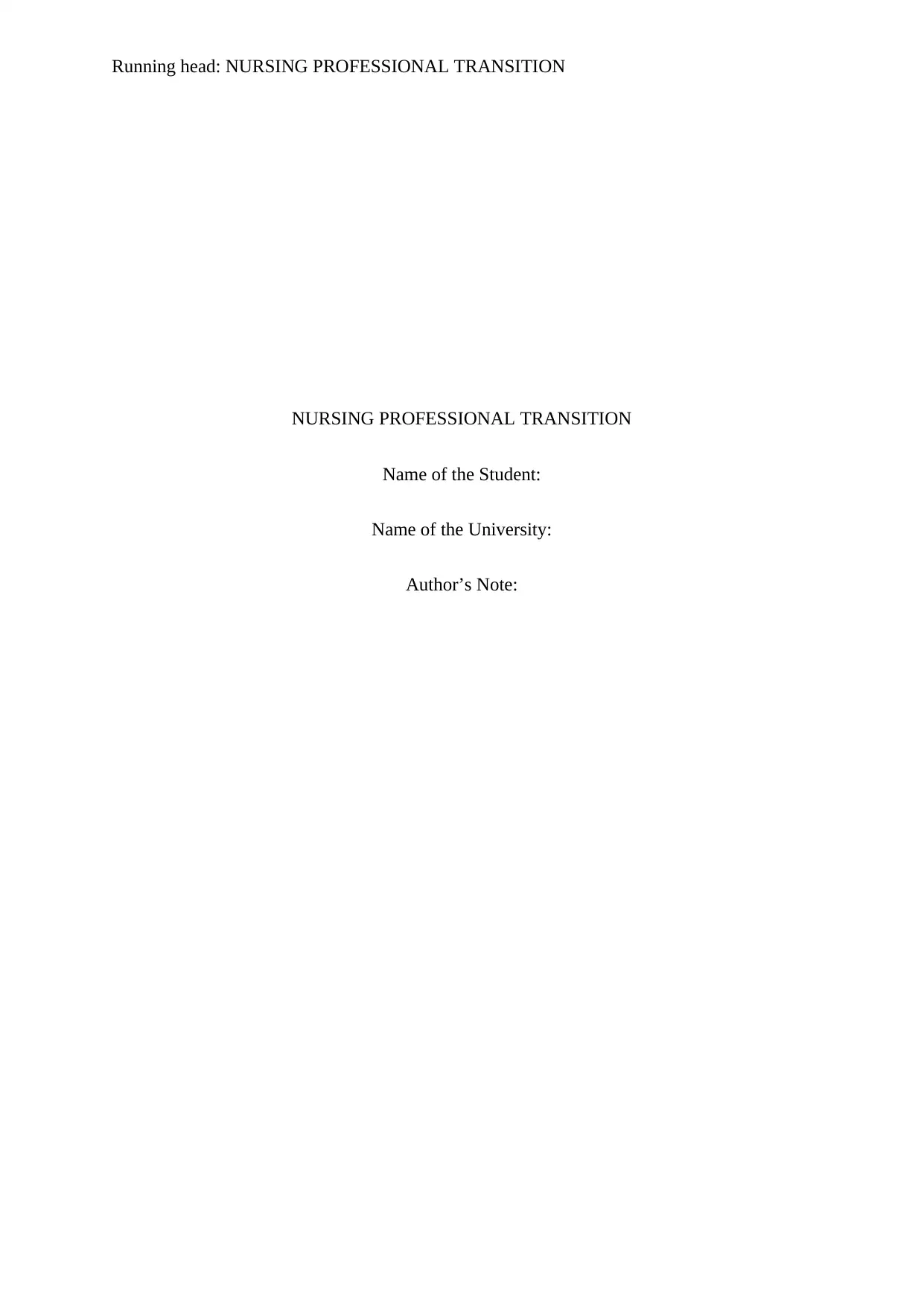
Running head: NURSING PROFESSIONAL TRANSITION
NURSING PROFESSIONAL TRANSITION
Name of the Student:
Name of the University:
Author’s Note:
NURSING PROFESSIONAL TRANSITION
Name of the Student:
Name of the University:
Author’s Note:
Paraphrase This Document
Need a fresh take? Get an instant paraphrase of this document with our AI Paraphraser
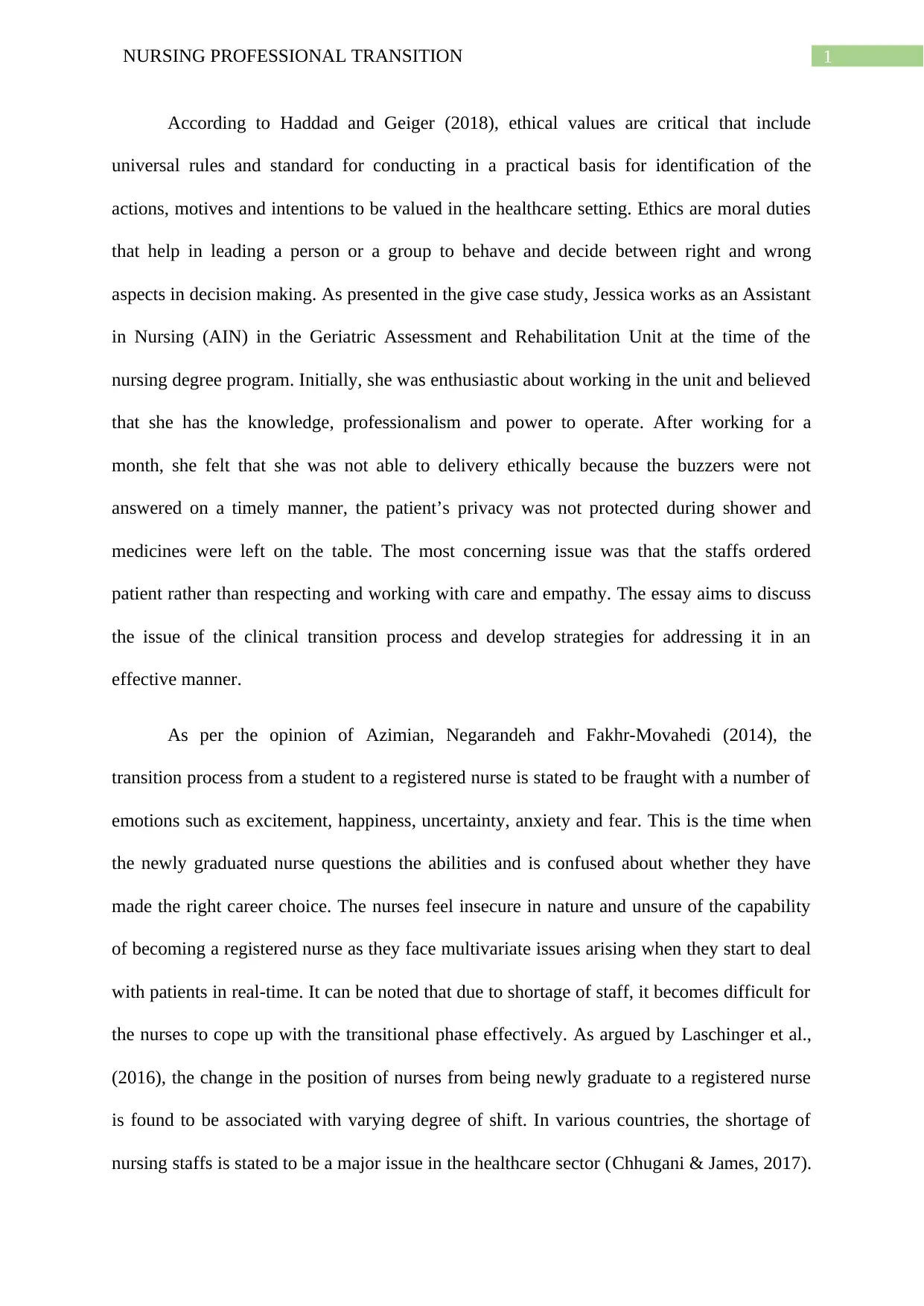
1NURSING PROFESSIONAL TRANSITION
According to Haddad and Geiger (2018), ethical values are critical that include
universal rules and standard for conducting in a practical basis for identification of the
actions, motives and intentions to be valued in the healthcare setting. Ethics are moral duties
that help in leading a person or a group to behave and decide between right and wrong
aspects in decision making. As presented in the give case study, Jessica works as an Assistant
in Nursing (AIN) in the Geriatric Assessment and Rehabilitation Unit at the time of the
nursing degree program. Initially, she was enthusiastic about working in the unit and believed
that she has the knowledge, professionalism and power to operate. After working for a
month, she felt that she was not able to delivery ethically because the buzzers were not
answered on a timely manner, the patient’s privacy was not protected during shower and
medicines were left on the table. The most concerning issue was that the staffs ordered
patient rather than respecting and working with care and empathy. The essay aims to discuss
the issue of the clinical transition process and develop strategies for addressing it in an
effective manner.
As per the opinion of Azimian, Negarandeh and Fakhr-Movahedi (2014), the
transition process from a student to a registered nurse is stated to be fraught with a number of
emotions such as excitement, happiness, uncertainty, anxiety and fear. This is the time when
the newly graduated nurse questions the abilities and is confused about whether they have
made the right career choice. The nurses feel insecure in nature and unsure of the capability
of becoming a registered nurse as they face multivariate issues arising when they start to deal
with patients in real-time. It can be noted that due to shortage of staff, it becomes difficult for
the nurses to cope up with the transitional phase effectively. As argued by Laschinger et al.,
(2016), the change in the position of nurses from being newly graduate to a registered nurse
is found to be associated with varying degree of shift. In various countries, the shortage of
nursing staffs is stated to be a major issue in the healthcare sector (Chhugani & James, 2017).
According to Haddad and Geiger (2018), ethical values are critical that include
universal rules and standard for conducting in a practical basis for identification of the
actions, motives and intentions to be valued in the healthcare setting. Ethics are moral duties
that help in leading a person or a group to behave and decide between right and wrong
aspects in decision making. As presented in the give case study, Jessica works as an Assistant
in Nursing (AIN) in the Geriatric Assessment and Rehabilitation Unit at the time of the
nursing degree program. Initially, she was enthusiastic about working in the unit and believed
that she has the knowledge, professionalism and power to operate. After working for a
month, she felt that she was not able to delivery ethically because the buzzers were not
answered on a timely manner, the patient’s privacy was not protected during shower and
medicines were left on the table. The most concerning issue was that the staffs ordered
patient rather than respecting and working with care and empathy. The essay aims to discuss
the issue of the clinical transition process and develop strategies for addressing it in an
effective manner.
As per the opinion of Azimian, Negarandeh and Fakhr-Movahedi (2014), the
transition process from a student to a registered nurse is stated to be fraught with a number of
emotions such as excitement, happiness, uncertainty, anxiety and fear. This is the time when
the newly graduated nurse questions the abilities and is confused about whether they have
made the right career choice. The nurses feel insecure in nature and unsure of the capability
of becoming a registered nurse as they face multivariate issues arising when they start to deal
with patients in real-time. It can be noted that due to shortage of staff, it becomes difficult for
the nurses to cope up with the transitional phase effectively. As argued by Laschinger et al.,
(2016), the change in the position of nurses from being newly graduate to a registered nurse
is found to be associated with varying degree of shift. In various countries, the shortage of
nursing staffs is stated to be a major issue in the healthcare sector (Chhugani & James, 2017).
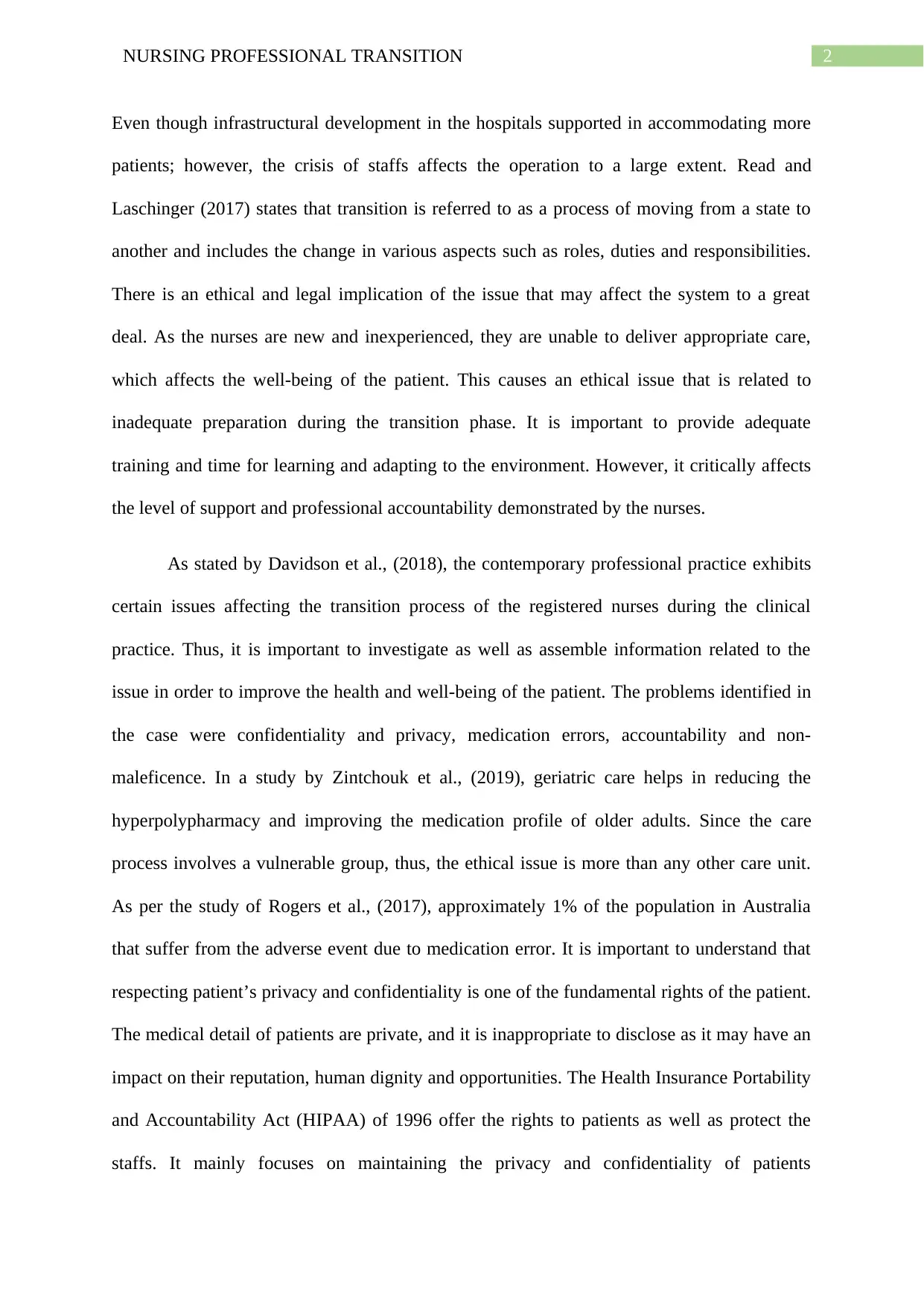
2NURSING PROFESSIONAL TRANSITION
Even though infrastructural development in the hospitals supported in accommodating more
patients; however, the crisis of staffs affects the operation to a large extent. Read and
Laschinger (2017) states that transition is referred to as a process of moving from a state to
another and includes the change in various aspects such as roles, duties and responsibilities.
There is an ethical and legal implication of the issue that may affect the system to a great
deal. As the nurses are new and inexperienced, they are unable to deliver appropriate care,
which affects the well-being of the patient. This causes an ethical issue that is related to
inadequate preparation during the transition phase. It is important to provide adequate
training and time for learning and adapting to the environment. However, it critically affects
the level of support and professional accountability demonstrated by the nurses.
As stated by Davidson et al., (2018), the contemporary professional practice exhibits
certain issues affecting the transition process of the registered nurses during the clinical
practice. Thus, it is important to investigate as well as assemble information related to the
issue in order to improve the health and well-being of the patient. The problems identified in
the case were confidentiality and privacy, medication errors, accountability and non-
maleficence. In a study by Zintchouk et al., (2019), geriatric care helps in reducing the
hyperpolypharmacy and improving the medication profile of older adults. Since the care
process involves a vulnerable group, thus, the ethical issue is more than any other care unit.
As per the study of Rogers et al., (2017), approximately 1% of the population in Australia
that suffer from the adverse event due to medication error. It is important to understand that
respecting patient’s privacy and confidentiality is one of the fundamental rights of the patient.
The medical detail of patients are private, and it is inappropriate to disclose as it may have an
impact on their reputation, human dignity and opportunities. The Health Insurance Portability
and Accountability Act (HIPAA) of 1996 offer the rights to patients as well as protect the
staffs. It mainly focuses on maintaining the privacy and confidentiality of patients
Even though infrastructural development in the hospitals supported in accommodating more
patients; however, the crisis of staffs affects the operation to a large extent. Read and
Laschinger (2017) states that transition is referred to as a process of moving from a state to
another and includes the change in various aspects such as roles, duties and responsibilities.
There is an ethical and legal implication of the issue that may affect the system to a great
deal. As the nurses are new and inexperienced, they are unable to deliver appropriate care,
which affects the well-being of the patient. This causes an ethical issue that is related to
inadequate preparation during the transition phase. It is important to provide adequate
training and time for learning and adapting to the environment. However, it critically affects
the level of support and professional accountability demonstrated by the nurses.
As stated by Davidson et al., (2018), the contemporary professional practice exhibits
certain issues affecting the transition process of the registered nurses during the clinical
practice. Thus, it is important to investigate as well as assemble information related to the
issue in order to improve the health and well-being of the patient. The problems identified in
the case were confidentiality and privacy, medication errors, accountability and non-
maleficence. In a study by Zintchouk et al., (2019), geriatric care helps in reducing the
hyperpolypharmacy and improving the medication profile of older adults. Since the care
process involves a vulnerable group, thus, the ethical issue is more than any other care unit.
As per the study of Rogers et al., (2017), approximately 1% of the population in Australia
that suffer from the adverse event due to medication error. It is important to understand that
respecting patient’s privacy and confidentiality is one of the fundamental rights of the patient.
The medical detail of patients are private, and it is inappropriate to disclose as it may have an
impact on their reputation, human dignity and opportunities. The Health Insurance Portability
and Accountability Act (HIPAA) of 1996 offer the rights to patients as well as protect the
staffs. It mainly focuses on maintaining the privacy and confidentiality of patients
⊘ This is a preview!⊘
Do you want full access?
Subscribe today to unlock all pages.

Trusted by 1+ million students worldwide
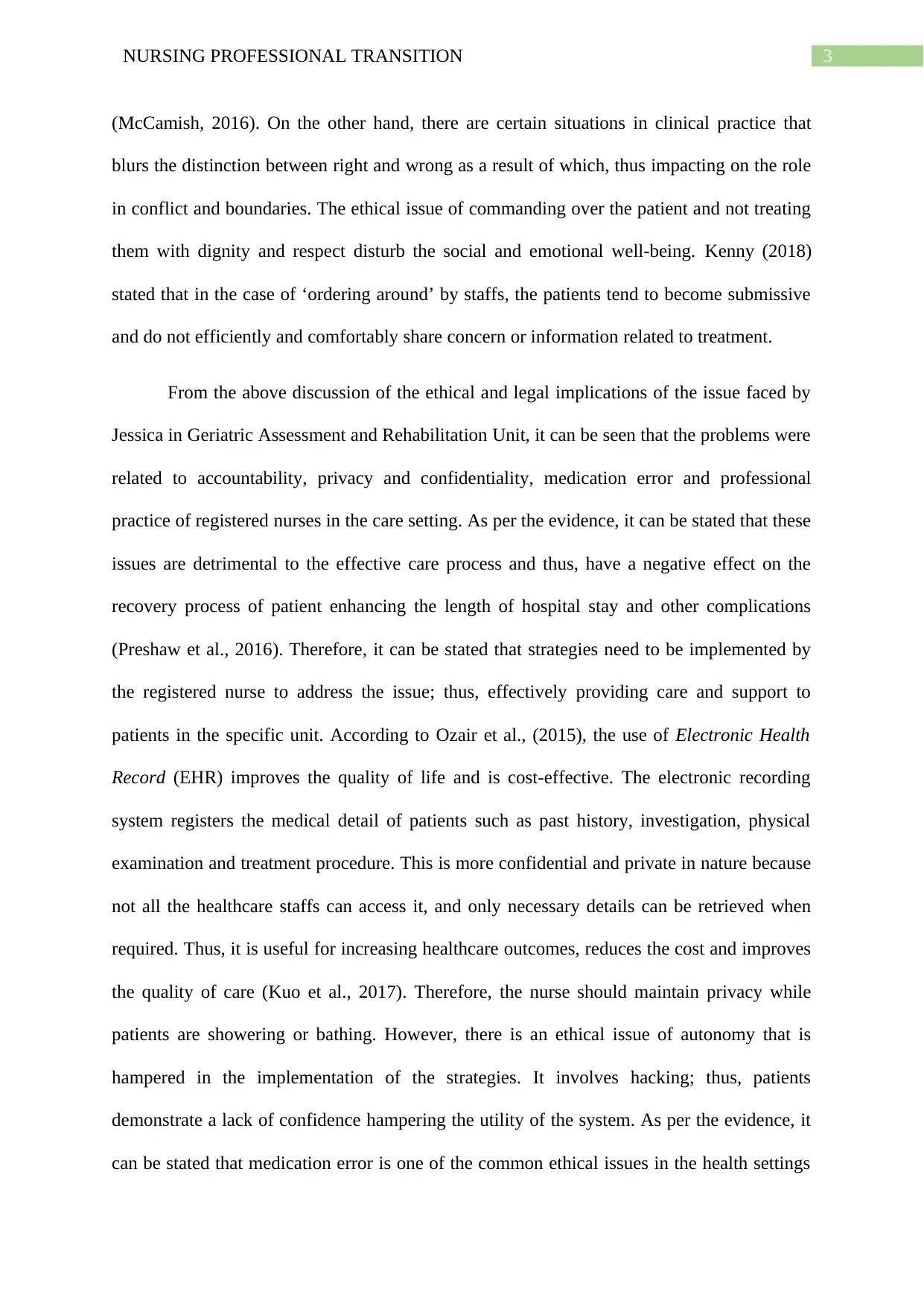
3NURSING PROFESSIONAL TRANSITION
(McCamish, 2016). On the other hand, there are certain situations in clinical practice that
blurs the distinction between right and wrong as a result of which, thus impacting on the role
in conflict and boundaries. The ethical issue of commanding over the patient and not treating
them with dignity and respect disturb the social and emotional well-being. Kenny (2018)
stated that in the case of ‘ordering around’ by staffs, the patients tend to become submissive
and do not efficiently and comfortably share concern or information related to treatment.
From the above discussion of the ethical and legal implications of the issue faced by
Jessica in Geriatric Assessment and Rehabilitation Unit, it can be seen that the problems were
related to accountability, privacy and confidentiality, medication error and professional
practice of registered nurses in the care setting. As per the evidence, it can be stated that these
issues are detrimental to the effective care process and thus, have a negative effect on the
recovery process of patient enhancing the length of hospital stay and other complications
(Preshaw et al., 2016). Therefore, it can be stated that strategies need to be implemented by
the registered nurse to address the issue; thus, effectively providing care and support to
patients in the specific unit. According to Ozair et al., (2015), the use of Electronic Health
Record (EHR) improves the quality of life and is cost-effective. The electronic recording
system registers the medical detail of patients such as past history, investigation, physical
examination and treatment procedure. This is more confidential and private in nature because
not all the healthcare staffs can access it, and only necessary details can be retrieved when
required. Thus, it is useful for increasing healthcare outcomes, reduces the cost and improves
the quality of care (Kuo et al., 2017). Therefore, the nurse should maintain privacy while
patients are showering or bathing. However, there is an ethical issue of autonomy that is
hampered in the implementation of the strategies. It involves hacking; thus, patients
demonstrate a lack of confidence hampering the utility of the system. As per the evidence, it
can be stated that medication error is one of the common ethical issues in the health settings
(McCamish, 2016). On the other hand, there are certain situations in clinical practice that
blurs the distinction between right and wrong as a result of which, thus impacting on the role
in conflict and boundaries. The ethical issue of commanding over the patient and not treating
them with dignity and respect disturb the social and emotional well-being. Kenny (2018)
stated that in the case of ‘ordering around’ by staffs, the patients tend to become submissive
and do not efficiently and comfortably share concern or information related to treatment.
From the above discussion of the ethical and legal implications of the issue faced by
Jessica in Geriatric Assessment and Rehabilitation Unit, it can be seen that the problems were
related to accountability, privacy and confidentiality, medication error and professional
practice of registered nurses in the care setting. As per the evidence, it can be stated that these
issues are detrimental to the effective care process and thus, have a negative effect on the
recovery process of patient enhancing the length of hospital stay and other complications
(Preshaw et al., 2016). Therefore, it can be stated that strategies need to be implemented by
the registered nurse to address the issue; thus, effectively providing care and support to
patients in the specific unit. According to Ozair et al., (2015), the use of Electronic Health
Record (EHR) improves the quality of life and is cost-effective. The electronic recording
system registers the medical detail of patients such as past history, investigation, physical
examination and treatment procedure. This is more confidential and private in nature because
not all the healthcare staffs can access it, and only necessary details can be retrieved when
required. Thus, it is useful for increasing healthcare outcomes, reduces the cost and improves
the quality of care (Kuo et al., 2017). Therefore, the nurse should maintain privacy while
patients are showering or bathing. However, there is an ethical issue of autonomy that is
hampered in the implementation of the strategies. It involves hacking; thus, patients
demonstrate a lack of confidence hampering the utility of the system. As per the evidence, it
can be stated that medication error is one of the common ethical issues in the health settings
Paraphrase This Document
Need a fresh take? Get an instant paraphrase of this document with our AI Paraphraser
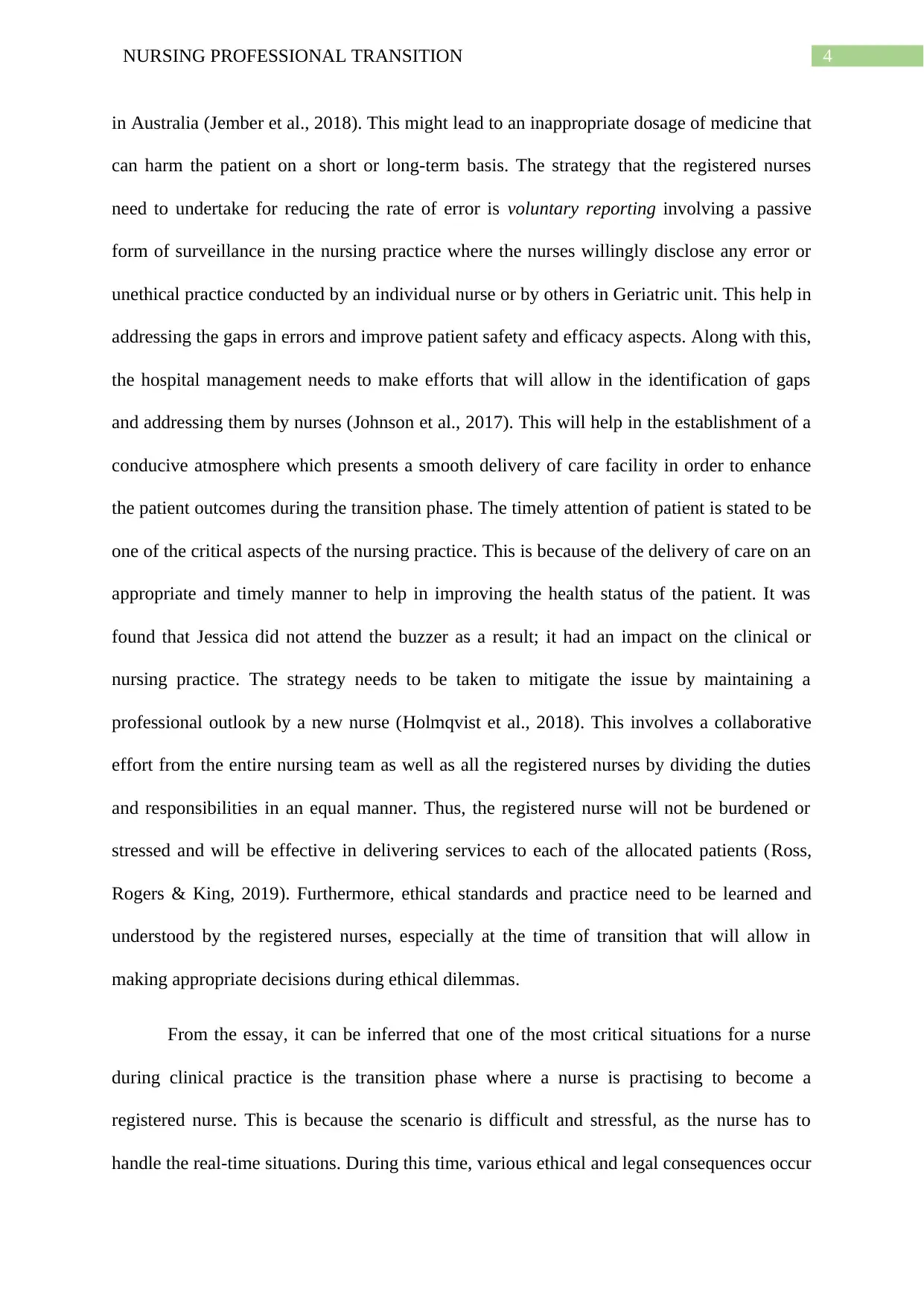
4NURSING PROFESSIONAL TRANSITION
in Australia (Jember et al., 2018). This might lead to an inappropriate dosage of medicine that
can harm the patient on a short or long-term basis. The strategy that the registered nurses
need to undertake for reducing the rate of error is voluntary reporting involving a passive
form of surveillance in the nursing practice where the nurses willingly disclose any error or
unethical practice conducted by an individual nurse or by others in Geriatric unit. This help in
addressing the gaps in errors and improve patient safety and efficacy aspects. Along with this,
the hospital management needs to make efforts that will allow in the identification of gaps
and addressing them by nurses (Johnson et al., 2017). This will help in the establishment of a
conducive atmosphere which presents a smooth delivery of care facility in order to enhance
the patient outcomes during the transition phase. The timely attention of patient is stated to be
one of the critical aspects of the nursing practice. This is because of the delivery of care on an
appropriate and timely manner to help in improving the health status of the patient. It was
found that Jessica did not attend the buzzer as a result; it had an impact on the clinical or
nursing practice. The strategy needs to be taken to mitigate the issue by maintaining a
professional outlook by a new nurse (Holmqvist et al., 2018). This involves a collaborative
effort from the entire nursing team as well as all the registered nurses by dividing the duties
and responsibilities in an equal manner. Thus, the registered nurse will not be burdened or
stressed and will be effective in delivering services to each of the allocated patients (Ross,
Rogers & King, 2019). Furthermore, ethical standards and practice need to be learned and
understood by the registered nurses, especially at the time of transition that will allow in
making appropriate decisions during ethical dilemmas.
From the essay, it can be inferred that one of the most critical situations for a nurse
during clinical practice is the transition phase where a nurse is practising to become a
registered nurse. This is because the scenario is difficult and stressful, as the nurse has to
handle the real-time situations. During this time, various ethical and legal consequences occur
in Australia (Jember et al., 2018). This might lead to an inappropriate dosage of medicine that
can harm the patient on a short or long-term basis. The strategy that the registered nurses
need to undertake for reducing the rate of error is voluntary reporting involving a passive
form of surveillance in the nursing practice where the nurses willingly disclose any error or
unethical practice conducted by an individual nurse or by others in Geriatric unit. This help in
addressing the gaps in errors and improve patient safety and efficacy aspects. Along with this,
the hospital management needs to make efforts that will allow in the identification of gaps
and addressing them by nurses (Johnson et al., 2017). This will help in the establishment of a
conducive atmosphere which presents a smooth delivery of care facility in order to enhance
the patient outcomes during the transition phase. The timely attention of patient is stated to be
one of the critical aspects of the nursing practice. This is because of the delivery of care on an
appropriate and timely manner to help in improving the health status of the patient. It was
found that Jessica did not attend the buzzer as a result; it had an impact on the clinical or
nursing practice. The strategy needs to be taken to mitigate the issue by maintaining a
professional outlook by a new nurse (Holmqvist et al., 2018). This involves a collaborative
effort from the entire nursing team as well as all the registered nurses by dividing the duties
and responsibilities in an equal manner. Thus, the registered nurse will not be burdened or
stressed and will be effective in delivering services to each of the allocated patients (Ross,
Rogers & King, 2019). Furthermore, ethical standards and practice need to be learned and
understood by the registered nurses, especially at the time of transition that will allow in
making appropriate decisions during ethical dilemmas.
From the essay, it can be inferred that one of the most critical situations for a nurse
during clinical practice is the transition phase where a nurse is practising to become a
registered nurse. This is because the scenario is difficult and stressful, as the nurse has to
handle the real-time situations. During this time, various ethical and legal consequences occur
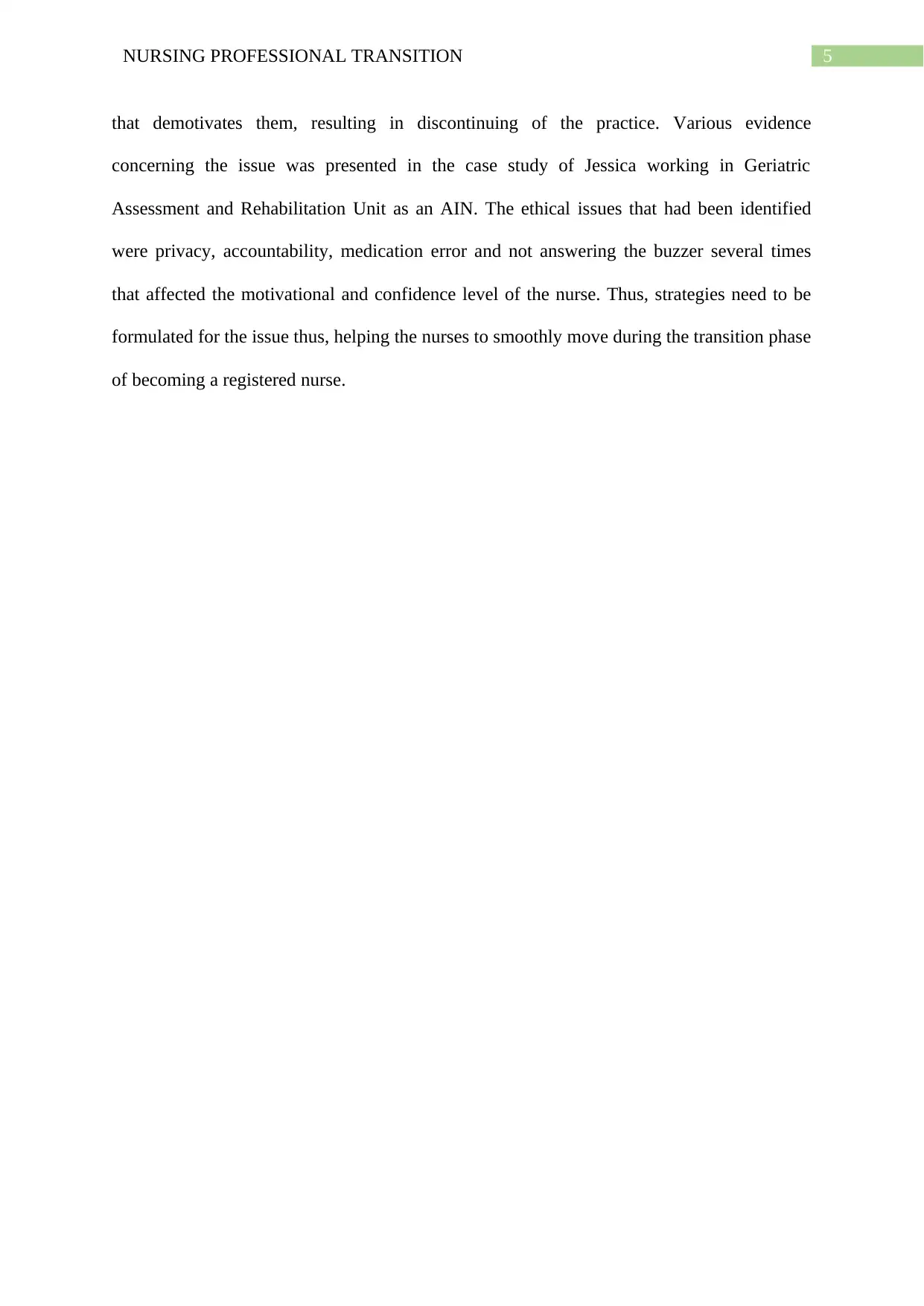
5NURSING PROFESSIONAL TRANSITION
that demotivates them, resulting in discontinuing of the practice. Various evidence
concerning the issue was presented in the case study of Jessica working in Geriatric
Assessment and Rehabilitation Unit as an AIN. The ethical issues that had been identified
were privacy, accountability, medication error and not answering the buzzer several times
that affected the motivational and confidence level of the nurse. Thus, strategies need to be
formulated for the issue thus, helping the nurses to smoothly move during the transition phase
of becoming a registered nurse.
that demotivates them, resulting in discontinuing of the practice. Various evidence
concerning the issue was presented in the case study of Jessica working in Geriatric
Assessment and Rehabilitation Unit as an AIN. The ethical issues that had been identified
were privacy, accountability, medication error and not answering the buzzer several times
that affected the motivational and confidence level of the nurse. Thus, strategies need to be
formulated for the issue thus, helping the nurses to smoothly move during the transition phase
of becoming a registered nurse.
⊘ This is a preview!⊘
Do you want full access?
Subscribe today to unlock all pages.

Trusted by 1+ million students worldwide
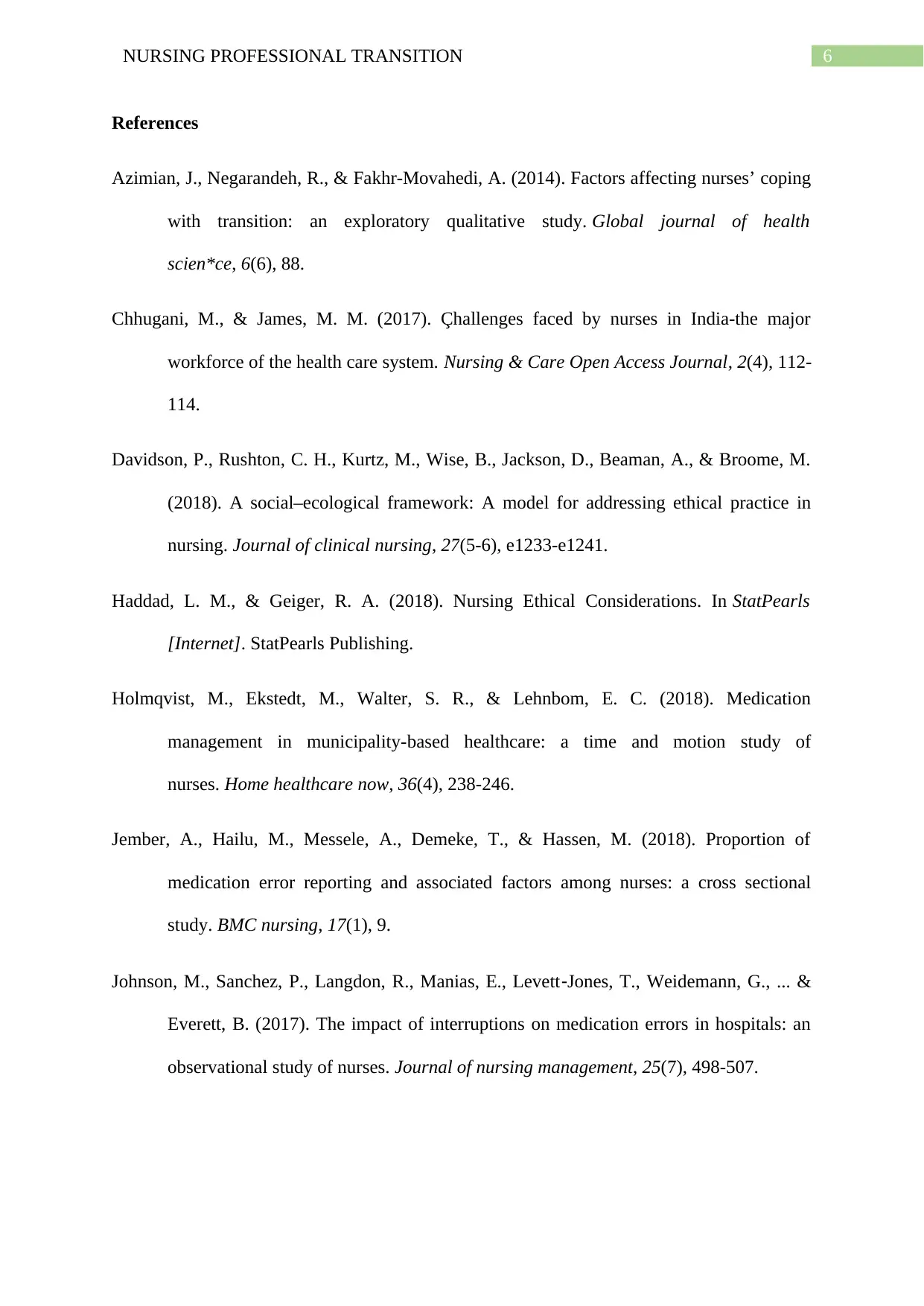
6NURSING PROFESSIONAL TRANSITION
References
Azimian, J., Negarandeh, R., & Fakhr-Movahedi, A. (2014). Factors affecting nurses’ coping
with transition: an exploratory qualitative study. Global journal of health
scien*ce, 6(6), 88.
Chhugani, M., & James, M. M. (2017). Çhallenges faced by nurses in India-the major
workforce of the health care system. Nursing & Care Open Access Journal, 2(4), 112-
114.
Davidson, P., Rushton, C. H., Kurtz, M., Wise, B., Jackson, D., Beaman, A., & Broome, M.
(2018). A social–ecological framework: A model for addressing ethical practice in
nursing. Journal of clinical nursing, 27(5-6), e1233-e1241.
Haddad, L. M., & Geiger, R. A. (2018). Nursing Ethical Considerations. In StatPearls
[Internet]. StatPearls Publishing.
Holmqvist, M., Ekstedt, M., Walter, S. R., & Lehnbom, E. C. (2018). Medication
management in municipality-based healthcare: a time and motion study of
nurses. Home healthcare now, 36(4), 238-246.
Jember, A., Hailu, M., Messele, A., Demeke, T., & Hassen, M. (2018). Proportion of
medication error reporting and associated factors among nurses: a cross sectional
study. BMC nursing, 17(1), 9.
Johnson, M., Sanchez, P., Langdon, R., Manias, E., Levett‐Jones, T., Weidemann, G., ... &
Everett, B. (2017). The impact of interruptions on medication errors in hospitals: an
observational study of nurses. Journal of nursing management, 25(7), 498-507.
References
Azimian, J., Negarandeh, R., & Fakhr-Movahedi, A. (2014). Factors affecting nurses’ coping
with transition: an exploratory qualitative study. Global journal of health
scien*ce, 6(6), 88.
Chhugani, M., & James, M. M. (2017). Çhallenges faced by nurses in India-the major
workforce of the health care system. Nursing & Care Open Access Journal, 2(4), 112-
114.
Davidson, P., Rushton, C. H., Kurtz, M., Wise, B., Jackson, D., Beaman, A., & Broome, M.
(2018). A social–ecological framework: A model for addressing ethical practice in
nursing. Journal of clinical nursing, 27(5-6), e1233-e1241.
Haddad, L. M., & Geiger, R. A. (2018). Nursing Ethical Considerations. In StatPearls
[Internet]. StatPearls Publishing.
Holmqvist, M., Ekstedt, M., Walter, S. R., & Lehnbom, E. C. (2018). Medication
management in municipality-based healthcare: a time and motion study of
nurses. Home healthcare now, 36(4), 238-246.
Jember, A., Hailu, M., Messele, A., Demeke, T., & Hassen, M. (2018). Proportion of
medication error reporting and associated factors among nurses: a cross sectional
study. BMC nursing, 17(1), 9.
Johnson, M., Sanchez, P., Langdon, R., Manias, E., Levett‐Jones, T., Weidemann, G., ... &
Everett, B. (2017). The impact of interruptions on medication errors in hospitals: an
observational study of nurses. Journal of nursing management, 25(7), 498-507.
Paraphrase This Document
Need a fresh take? Get an instant paraphrase of this document with our AI Paraphraser
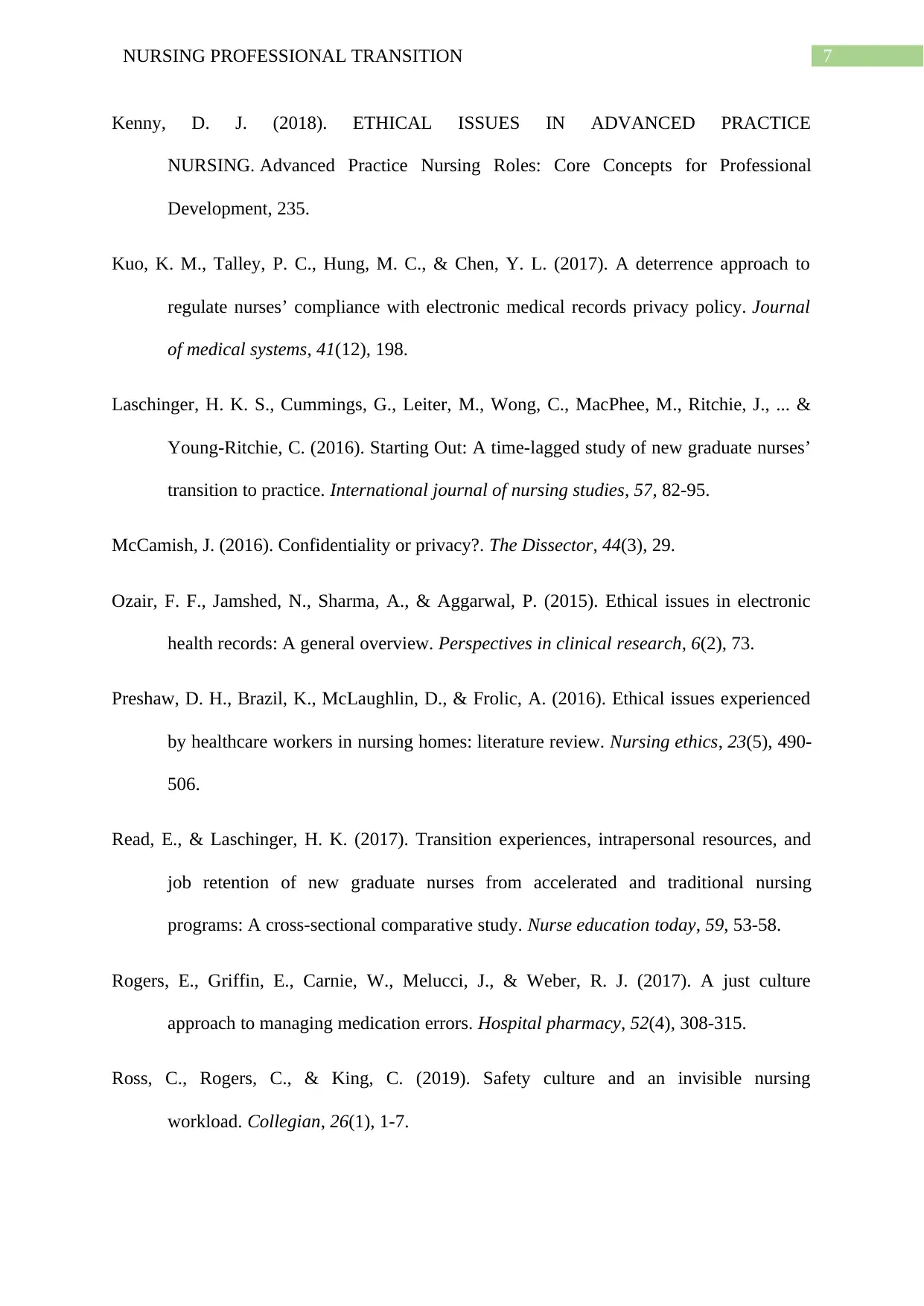
7NURSING PROFESSIONAL TRANSITION
Kenny, D. J. (2018). ETHICAL ISSUES IN ADVANCED PRACTICE
NURSING. Advanced Practice Nursing Roles: Core Concepts for Professional
Development, 235.
Kuo, K. M., Talley, P. C., Hung, M. C., & Chen, Y. L. (2017). A deterrence approach to
regulate nurses’ compliance with electronic medical records privacy policy. Journal
of medical systems, 41(12), 198.
Laschinger, H. K. S., Cummings, G., Leiter, M., Wong, C., MacPhee, M., Ritchie, J., ... &
Young-Ritchie, C. (2016). Starting Out: A time-lagged study of new graduate nurses’
transition to practice. International journal of nursing studies, 57, 82-95.
McCamish, J. (2016). Confidentiality or privacy?. The Dissector, 44(3), 29.
Ozair, F. F., Jamshed, N., Sharma, A., & Aggarwal, P. (2015). Ethical issues in electronic
health records: A general overview. Perspectives in clinical research, 6(2), 73.
Preshaw, D. H., Brazil, K., McLaughlin, D., & Frolic, A. (2016). Ethical issues experienced
by healthcare workers in nursing homes: literature review. Nursing ethics, 23(5), 490-
506.
Read, E., & Laschinger, H. K. (2017). Transition experiences, intrapersonal resources, and
job retention of new graduate nurses from accelerated and traditional nursing
programs: A cross-sectional comparative study. Nurse education today, 59, 53-58.
Rogers, E., Griffin, E., Carnie, W., Melucci, J., & Weber, R. J. (2017). A just culture
approach to managing medication errors. Hospital pharmacy, 52(4), 308-315.
Ross, C., Rogers, C., & King, C. (2019). Safety culture and an invisible nursing
workload. Collegian, 26(1), 1-7.
Kenny, D. J. (2018). ETHICAL ISSUES IN ADVANCED PRACTICE
NURSING. Advanced Practice Nursing Roles: Core Concepts for Professional
Development, 235.
Kuo, K. M., Talley, P. C., Hung, M. C., & Chen, Y. L. (2017). A deterrence approach to
regulate nurses’ compliance with electronic medical records privacy policy. Journal
of medical systems, 41(12), 198.
Laschinger, H. K. S., Cummings, G., Leiter, M., Wong, C., MacPhee, M., Ritchie, J., ... &
Young-Ritchie, C. (2016). Starting Out: A time-lagged study of new graduate nurses’
transition to practice. International journal of nursing studies, 57, 82-95.
McCamish, J. (2016). Confidentiality or privacy?. The Dissector, 44(3), 29.
Ozair, F. F., Jamshed, N., Sharma, A., & Aggarwal, P. (2015). Ethical issues in electronic
health records: A general overview. Perspectives in clinical research, 6(2), 73.
Preshaw, D. H., Brazil, K., McLaughlin, D., & Frolic, A. (2016). Ethical issues experienced
by healthcare workers in nursing homes: literature review. Nursing ethics, 23(5), 490-
506.
Read, E., & Laschinger, H. K. (2017). Transition experiences, intrapersonal resources, and
job retention of new graduate nurses from accelerated and traditional nursing
programs: A cross-sectional comparative study. Nurse education today, 59, 53-58.
Rogers, E., Griffin, E., Carnie, W., Melucci, J., & Weber, R. J. (2017). A just culture
approach to managing medication errors. Hospital pharmacy, 52(4), 308-315.
Ross, C., Rogers, C., & King, C. (2019). Safety culture and an invisible nursing
workload. Collegian, 26(1), 1-7.
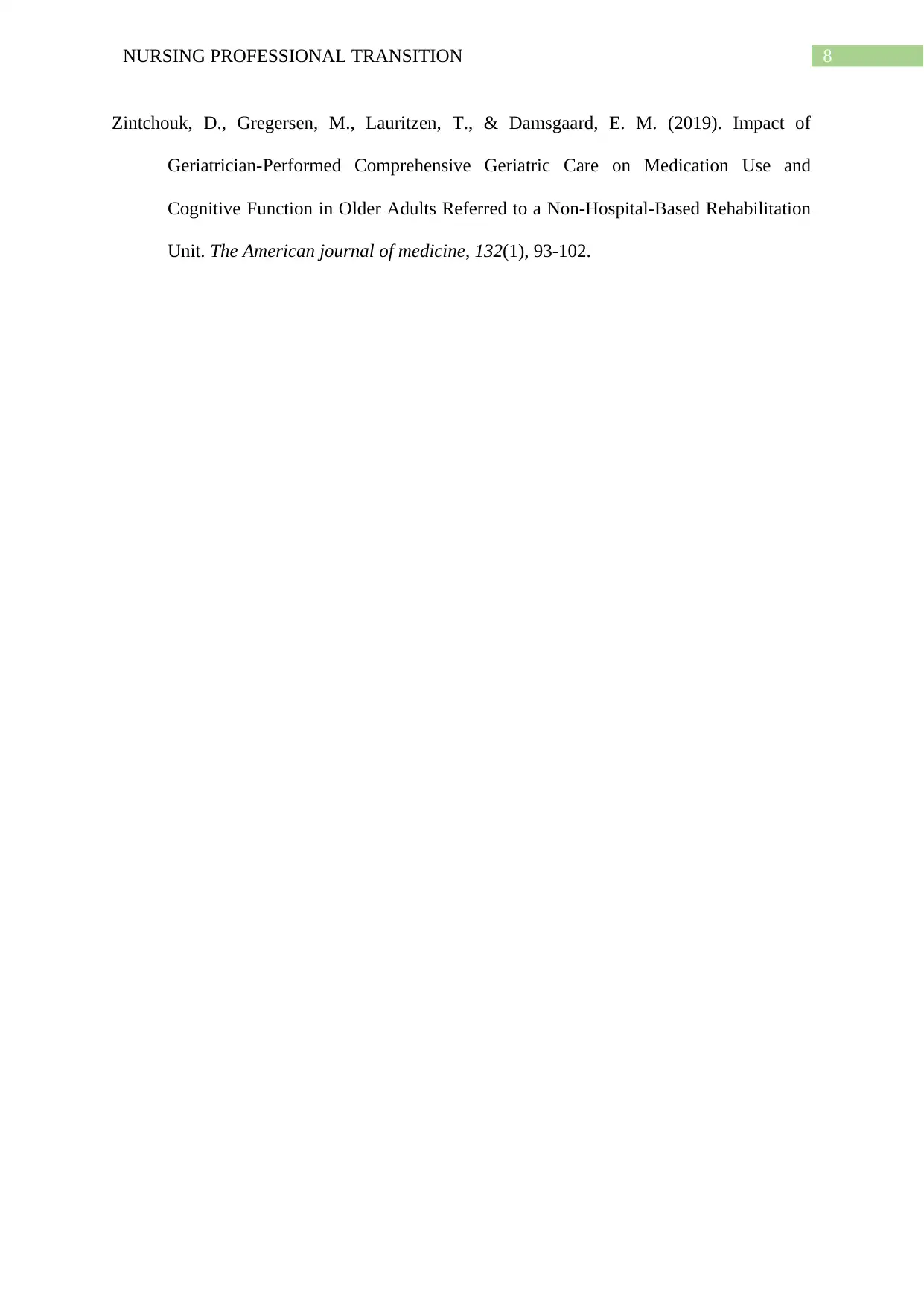
8NURSING PROFESSIONAL TRANSITION
Zintchouk, D., Gregersen, M., Lauritzen, T., & Damsgaard, E. M. (2019). Impact of
Geriatrician-Performed Comprehensive Geriatric Care on Medication Use and
Cognitive Function in Older Adults Referred to a Non-Hospital-Based Rehabilitation
Unit. The American journal of medicine, 132(1), 93-102.
Zintchouk, D., Gregersen, M., Lauritzen, T., & Damsgaard, E. M. (2019). Impact of
Geriatrician-Performed Comprehensive Geriatric Care on Medication Use and
Cognitive Function in Older Adults Referred to a Non-Hospital-Based Rehabilitation
Unit. The American journal of medicine, 132(1), 93-102.
⊘ This is a preview!⊘
Do you want full access?
Subscribe today to unlock all pages.

Trusted by 1+ million students worldwide
1 out of 9
Related Documents
Your All-in-One AI-Powered Toolkit for Academic Success.
+13062052269
info@desklib.com
Available 24*7 on WhatsApp / Email
![[object Object]](/_next/static/media/star-bottom.7253800d.svg)
Unlock your academic potential
Copyright © 2020–2026 A2Z Services. All Rights Reserved. Developed and managed by ZUCOL.





